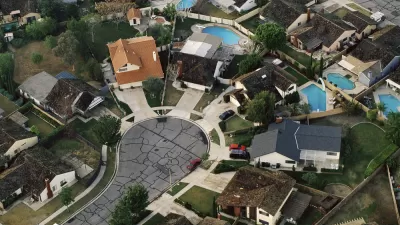In the 1930s, The Federal Housing Authority embraced the trend towards cul-de-sacs, decrying the standard street grid as monotonous and unsafe. Norman Garrick and Wesley Marshall have proven otherwise.
Garrick and Marshall's research shows that yes, the person living on the cul-de-sac is safer - if they never leave their block. But the suburban road structure that makes cul-de-sacs possible is more dangerous than a grid.
Emily Badger talked with Garrick and Marshall, as well as Scott Bernstein of the Center for Neighborhood Technology:
"Garrick and Marshall compiled data on 230,000 crashes spanning 11 years in 24 medium-sized California cities. And they began to parse and classify street patterns in a kind of taxonomy."
"In their California study, Garrick and Marshall eventually realized the safest cities had an element in common: They were all incorporated before 1930. Something about the way they were designed made them safer."
FULL STORY: Debunking the Cul-de-Sac

Planetizen Federal Action Tracker
A weekly monitor of how Trump’s orders and actions are impacting planners and planning in America.

Map: Where Senate Republicans Want to Sell Your Public Lands
For public land advocates, the Senate Republicans’ proposal to sell millions of acres of public land in the West is “the biggest fight of their careers.”

Restaurant Patios Were a Pandemic Win — Why Were They so Hard to Keep?
Social distancing requirements and changes in travel patterns prompted cities to pilot new uses for street and sidewalk space. Then it got complicated.

Platform Pilsner: Vancouver Transit Agency Releases... a Beer?
TransLink will receive a portion of every sale of the four-pack.

Toronto Weighs Cheaper Transit, Parking Hikes for Major Events
Special event rates would take effect during large festivals, sports games and concerts to ‘discourage driving, manage congestion and free up space for transit.”

Berlin to Consider Car-Free Zone Larger Than Manhattan
The area bound by the 22-mile Ringbahn would still allow 12 uses of a private automobile per year per person, and several other exemptions.
Urban Design for Planners 1: Software Tools
This six-course series explores essential urban design concepts using open source software and equips planners with the tools they need to participate fully in the urban design process.
Planning for Universal Design
Learn the tools for implementing Universal Design in planning regulations.
Heyer Gruel & Associates PA
JM Goldson LLC
Custer County Colorado
City of Camden Redevelopment Agency
City of Astoria
Transportation Research & Education Center (TREC) at Portland State University
Camden Redevelopment Agency
City of Claremont
Municipality of Princeton (NJ)





























